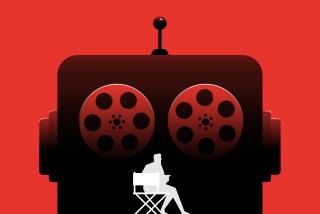Marian the Librarian Now Iris the Archivist
- Share via
Just don’t call him a cybrarian. “Digital archivist” is the preferred moniker, says Tom La Porte, a 26-year-old librarian and archivist at DreamWorks SKG. “Cyber” is passe, according to the self-styled computer geek.
La Porte and his fellow DreamWorks archivists are creating a “digital back lot” where animated character images, music scores, outtakes, soundtracks and special effects are stored on a computer instead of in the more traditional warehouse.
A librarian by training, La Porte archives information on computer files in a Silicon Graphics workstation, a state-of-the-art Macintosh and an IBM with half a terabyte of memory.
“At DreamWorks, they realize that everything they create has a value and needs to be made easily accessible,” La Porte says. “Props and scenery exist online and can be reused or altered. Or a toy company that wants to create a toy based on an animated character might now be able to use the artist’s original computer drawing.”
Animated films are so complex, La Porte says, that digital archivists are also needed to help directors keep track of the thousands of computer-generated components. For “Prince of Egypt,” an animated film based on the life of Moses scheduled for release in 1998, La Porte stores film sequences in computer files with headings like “Moses,” “Ramses” and “Burning Bush.”
A director can type a word like “fire” into the computer and see dozens of varieties of animated flames that can be reused. Compared with the physical props and sets that DreamWorks, like other studios, sometimes mothballs in warehouses, the computer archives will be less expensive to store and more accessible.
La Porte says he likes the work because it taps his training in library science and his interest in computers. “They wouldn’t have hired me if I only had the library of science background. It helped that I’m also a computer geek,” says La Porte, who worked as an archivist at Duke University before joining DreamWorks in the fall of 1995.
He says he’s noticed that among his former University of Michigan classmates with degrees in library science, those with strong computer backgrounds have had an easier time finding work.
“All librarians must be computer-literate,” agrees Albert Aubin, career counselor at UCLA’s Career Center. “Books are seen as just one source of information.”
A 1995 salary survey by the American Library Foundation showed that beginning librarians with the skills to work with specialized information, such as La Porte, can make far more than the average starting salary of $28,500.
“There is information overload today, and corporations are hiring librarians to help them find the specific information they need,” Aubin says.
At DreamWorks, that can mean keeping “the potential to go back and look at what a film looked like at any moment in production,” La Porte says. “Every take is there.”
More to Read
The biggest entertainment stories
Get our big stories about Hollywood, film, television, music, arts, culture and more right in your inbox as soon as they publish.
You may occasionally receive promotional content from the Los Angeles Times.










